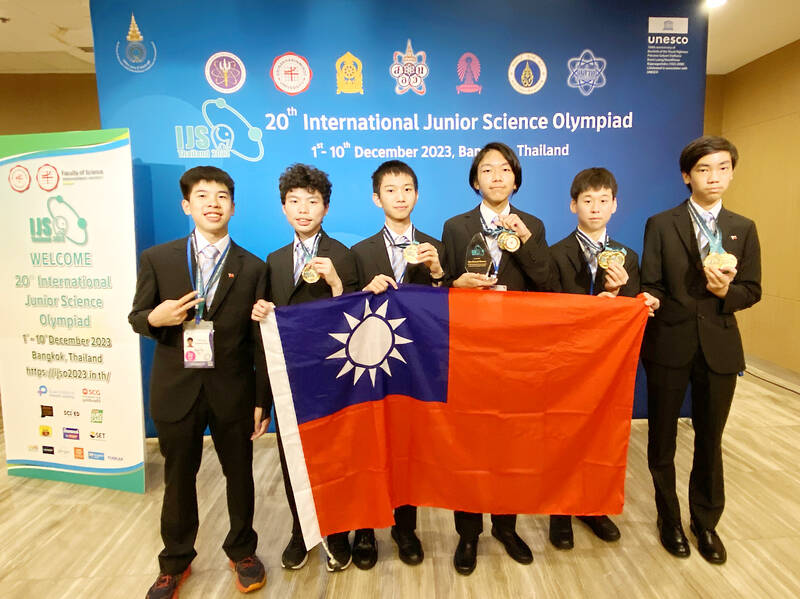All six Taiwanese participants in the 20th International Junior Science Olympiad, which was held in Thailand and ended yesterday, won gold medals, which put Taiwan in first place at the competition.
A total of 304 students from 54 countries and regions participated in the olympiad this year, with Taiwan sending two students each from three different junior-high schools. The Taiwanese team included Wu Ssu-chien (吳思謙) and Yan Tzu-chiao (顏子喬) from Taipei Municipal Chien Kuo High School; Chan Wei-chun (詹緯濬) and Lai Ching-yu (賴敬宇) from Taipei Municipal Dunhua Junior High School, and Hung Ching-cheng (洪靖承) and Su Cheng-hsuan (蘇程玹) from Tainan Municipal Jian Sing Junior High School.
Yan also scored highest overall among all participants in the competition.

Photo courtesy of the Ministry of Education
Commenting on the win, Yan said he was driven by his interest in science, and said that personal interest in the subject was key to his success. Reading instructions carefully and not rushing is also very important, he said.
The members of Taiwan’s team were chosen by a selection committee and coached by National Taiwan Normal University professors Lu Chia-jung (呂家榮), Lu Kuo-tung (呂國棟), Chang Yung-ta (張永達) and Fu Tzu-yi (傅祖怡), and assistant professor Liu Yi-hsin (劉沂欣). The team flew to Bangkok for the competition on Nov. 30, and returned on Wednesday.
The six students would each receive a recommendation for entrance to a top high school or junior college, as well as receiving a NT$200,000 scholarship, Ministry of Education official Tsai Yi-ching (蔡宜靜) said.
Taiwan has participated in the Olympiad every year it was held since 2004, and to date has won 97 gold medals, 17 silver medals and two special awards for individual student experiments. It has also won two gold medals, one silver medal and two bronze medals for group experiments, 12 best theory awards, nine highest total score awards and has been ranked as the top country or region in the competition 12 times.

Taiwan has received more than US$70 million in royalties as of the end of last year from developing the F-16V jet as countries worldwide purchase or upgrade to this popular model, government and military officials said on Saturday. Taiwan funded the development of the F-16V jet and ended up the sole investor as other countries withdrew from the program. Now the F-16V is increasingly popular and countries must pay Taiwan a percentage in royalties when they purchase new F-16V aircraft or upgrade older F-16 models. The next five years are expected to be the peak for these royalties, with Taiwan potentially earning

STAY IN YOUR LANE: As the US and Israel attack Iran, the ministry has warned China not to overstep by including Taiwanese citizens in its evacuation orders The Ministry of Foreign Affairs (MOFA) yesterday rebuked a statement by China’s embassy in Israel that it would evacuate Taiwanese holders of Chinese travel documents from Israel amid the latter’s escalating conflict with Iran. Tensions have risen across the Middle East in the wake of US and Israeli airstrikes on Iran beginning Saturday. China subsequently issued an evacuation notice for its citizens. In a news release, the Chinese embassy in Israel said holders of “Taiwan compatriot permits (台胞證)” issued to Taiwanese nationals by Chinese authorities for travel to China — could register for evacuation to Egypt. In Taipei, the ministry yesterday said Taiwan

‘LIKE-MINDED PARTNER’: Tako van Popta said it would be inappropriate to delay signing the deal with Taiwan because of China, adding he would promote the issue Canadian senators have stressed Taiwan’s importance for international trade and expressed enthusiasm for ensuring the Taiwan-Canada trade cooperation framework agreement is implemented this year. Representative to Canada Harry Tseng (曾厚仁) in an interview with the Central News Agency (CNA) said he was increasingly uneasy about Ottawa’s delays in signing the agreement, especially as Ottawa has warmed toward Beijing. There are “no negotiations left. Not only [is it] initialed, we have three versions of the text ready: English, French and Mandarin,” Tseng said. “That tells you how close we are to the final signature.” Tseng said that he hoped Canadian Prime Minister Mark Carney

POSITIVE DEVELOPMENT: Japan and the US are expected to hold in-depth discussions on Taiwan-related issues during the meeting next month, Japanese sources said The holding of a Japan-US leaders’ meeting ahead of US President Donald Trump’s visit to China is positive news for Taiwan, former Japan-Taiwan Exchange Association representative Hiroyasu Izumi said yesterday. After the Liberal Democratic Party’s landslide victory in Japan’s House of Representatives election, Japanese Prime Minister Sanae Takaichi is scheduled to visit the US next month, where she is to meet with Trump ahead of the US president’s planned visit to China from March 31 to April 2 for a meeting with Chinese President Xi Jinping (習近平). Japan and the US are expected to hold in-depth discussions on Taiwan-related issues during the